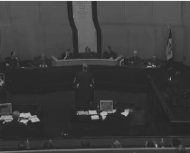3/11/2008
Iowa Supreme Court Hears Traffic Camera CaseIowa Supreme Court hears oral argument on case determining the legality of red light cameras and speed cameras.

The Iowa Supreme Court heard oral arguments earlier today in a case that will determine the fate of photo enforcement in the state. Representatives for the city of Davenport defended the municipal ordinance authorizing mailing of traffic tickets to the owners of vehicles accused of speeding or running a red light. Motorist Thomas J. Seymour appealed, arguing the city had no authority to mail him a $125 ticket in 2006 simply because he owned a car accused of speeding.
Justices in listening to both sides zeroed in on the possibility that under the Davenport ordinance, a single speeding vehicle could generate two citations. One civil ticket would go to the vehicle's owner and one criminal ticket would go to the driver.
"Yes, you're charging two different people with two different offenses," Davenport's attorney Craig Levien admitted, while explaining it might not be possible to issue two tickets when the driver is not also the owner.
American Civil Liberties Union lawyer Michael McCarthy, arguing on Seymour's behalf, said that this procedure is inconsistent with state law that mandates only owners are to be punished for traffic violations.
"The clear legislative intent is that owners are only going to be punished if they permit the conduct," McCarthy said.
Any inconsistency between a local ordinance and state law violates section 321.235 of the Iowa Code.
"The provisions of this chapter shall be applicable and uniform throughout this state and in all political subdivisions and municipalities therein," the law states. "And no local authority shall enact or enforce any rule or regulation in conflict with the provisions of this chapter unless expressly authorized herein."
The supreme courts of Minnesota and Ohio recently addressed the meaning of identically worded uniformity statutes in relation to photo enforcement. Minnesota last year found that, "Allowing each municipality to impose different liabilities would render the Act's uniformity requirement meaningless" (read opinion). The Ohio Supreme Court, on the other hand, ruled that, "The actual conduct prohibited -- exceeding speed limits -- is the same" (read opinion). Oral arguments in the Ohio case telegraphed well in advance that the outcome would be favorable to photo ticketing.
"It is almost intuitive without studies," Chief Justice Thomas J. Moyer said in September 2007. "If you're being watched at an intersection, you might not run that red light or you might operate your vehicle at the legal speed."
The Iowa high court justices met for a special session at Drake University Law School before first-year students.


